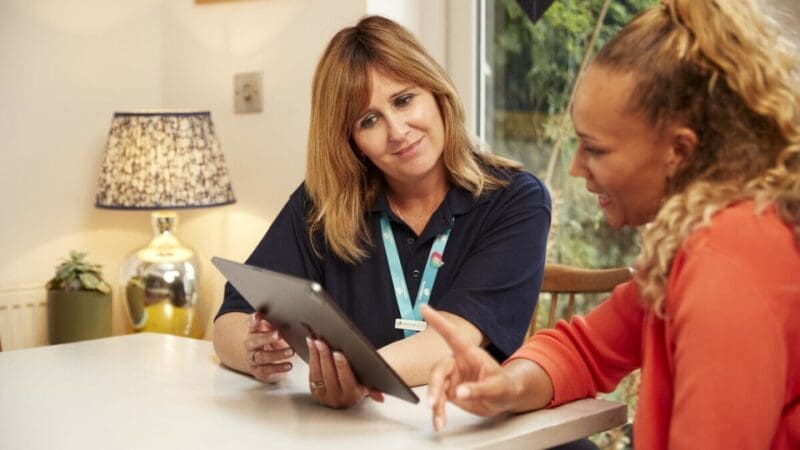
Nat’s story – “Being a young carer can be lonely”
Nat reflects on her experience of being a young carer and the support she received from the Nationwide dementia clinic.
Diabetes is a condition that causes a person’s blood sugars to be too high. It occurs when the body does not produce enough – or any – of the hormone insulin, which controls how it converts glucose (sugar) from food and drink to energy.
If a person has dementia and diabetes, they may need additional support with managing their diabetes. Our dementia specialist Admiral Nurses explain how you can help.
The two most common forms of diabetes are:
A lifelong condition where the body’s immune system attacks the cells that produce insulin. Everyone with type 1 diabetes needs to take insulin.
A condition where the body does not produce enough insulin, or the body’s cells do not react to insulin properly. Some people can manage type 2 diabetes through lifestyle – for example through diet, exercise and maintaining a healthy weight – but medication may be necessary.
Research shows that type 2 diabetes increases the risk of developing dementia. The reasons are uncertain, but people with diabetes are more likely to develop high blood pressure and cholesterol, which are risk factors for dementia.
People with type 1 diabetes who experience severe blood sugar highs and lows may also be at increased risk of dementia.
The risk of developing dementia increases with the length of time the person has lived with diabetes and its severity. However, having diabetes does not mean that someone will definitely develop dementia.
It is important for everyone with diabetes to ensure their condition is managed by following a healthy diet, being physically active, taking medication if required and attending health checks.
Dementia can make it harder for a person to manage their diabetes due to changes in their memory, concentration or diet. They are likely to need support to:
A person with diabetes may need to take medication, which could include:
It is important for the person to take any medication as prescribed, whether for their diabetes, dementia and/or other health conditions. They may need your help with this.
There are several types of technology that can help a person manage their diabetes, particularly if their blood sugars need to be tested frequently or they need insulin injections more than once a day.
Insulin pens are an easy-to-use alternative to a traditional syringe. They come with a cartridge of insulin rather than a vial that needs to be drawn up. The person’s dose can be pre-set to ensure they take the right amount.
A smart insulin pen automatically records the person’s last dose of insulin to help you monitor if they have taken the right dose at the right time. The information can be sent automatically to an app on a person’s phone. The pen can also send alerts if an injection is missed.
A small electronic device worn on the body which releases insulin at the right times, day and night, so the person does not have to inject themselves.
These are sensors worn on the body (usually on the back of the upper arm) that monitor blood sugars 24/7. This information is sent to the person’s smartphone, and to your phone if required. You can set an alarm to sound if blood sugars are too high or low. The most common type of flash/CGM is the Freestyle Libre system.
These can help people manage their diabetes, for example by counting their carbohydrate intake, setting medication alerts and tracking blood sugar levels over time.
Not all of this technology is available free on the NHS, so it is important to discuss the person’s suitability and eligibility with their diabetes specialist.
Dementia often has an impact on a person’s appetite and ability to eat and drink. This may affect how they manage their diabetes. The person may:
It is important to update the person’s Diabetic Team with any changes in their eating habits or weight, as their treatment may need to be reviewed. It may be helpful for the person to be weighed monthly to identify any changes.
People with dementia often do not drink enough and can quickly become dehydrated. This could increase their confusion and their chance of developing a urinary tract infection (UTI), which can lead to high blood sugar levels in people with diabetes. The person may need help to ensure they drink enough – you will find tips in our information on hydration.
If the person becomes excessively thirsty it is important that their blood sugars are checked. If they are extremely high, they will require a review by the GP/diabetic nurse.
Some people with dementia experience changes in vision. This could affect how well they can see their insulin doses, locate their tablets, or prepare and eat food, meaning they may need extra help managing their diabetes treatment.
However, diabetes can also affect a person’s vision. It can cause diabetic retinopathy (damage to the back of the eye, known as the retina) and increase the risk of glaucoma (damage to the optic nerve).
It is important not to assume that any vision changes are caused by the person’s dementia and to ensure they have regular eye tests and mention any changes to their optician or diabetes specialist.
Hypoglycaemia, or a ‘hypo’, is an episode of low blood sugar, which could be dangerous and even life-threatening. It may occur if the person takes too much diabetes medication, misses meals, drinks too much alcohol or exercises intensely.
It can be difficult to tell if a person with dementia is experiencing a hypo as the symptoms often overlap, including:
There may also be physical signs of low blood sugar, including:
A hypo needs to be treated promptly, so it is important to recognise the differences – which may be subtle – between the signs of a hypo and the person’s dementia symptoms. If the person seems particularly agitated, anxious and confused, test their blood sugar. If it is low, take steps to address this, for example by giving them a sugary drink, dextrose/glucose sweets or jelly babies.
If the person goes into a severe hypo, acting quickly is vital. Diabetes UK has information on treating a severe hypo. You should also call the person’s GP or NHS 111 for urgent advice.
It is helpful to keep a record of the person’s hypos to identify any patterns and help their healthcare team assess whether their blood sugar could be better managed.
It is also a good idea for the person with diabetes and dementia to carry a form of ID that explains their diagnoses, such as a wristband, ID card, medical alert jewellery, or an up-to-date health record on their phone. This will help them get the support they need if they become confused or unwell in public.
Many people with dementia become increasingly confused and unsettled in the evening. They may have a strong sense of being in the wrong place – for example, they may ask to go home, even if they are already at home. This is known as sundowning.
While this is common in dementia, it is important not to assume that a person with diabetes is sundowning, as these symptoms could also be a sign of low blood sugar. If they become very confused in the evening, check their blood sugar levels and, if they are low, encourage them to have a sugary drink or sweets.
People with diabetes are at greater risk of developing infections due to high blood sugar levels. Having an infection may itself affect the person’s blood sugars, so if you are concerned that they are ill, please speak to their GP.
A person with dementia is more likely to develop delirium if they have an infection. This is a state of sudden, intense confusion and disorientation. It needs to be treated immediately, so please contact their GP if there are rapid or unexpected changes in their behaviour.
Everyone with dementia should have an annual review with their GP. This should include:
People with diabetes should also have an annual diabetes review with their GP or diabetes specialist. This should include:
The person will also be invited for a separate eye appointment to check for diabetic retinopathy.
It is a good idea to go with the person to their reviews so you can share any new information and understand any advice they are given.
If the person is not invited for their diabetes or dementia review, contact their healthcare professional. It is useful to make a note of when they should happen in case the person with dementia forgets they are due or needs help arranging the appointments.
At some point, it is possible that the person you care for will need to be admitted to hospital, whether due to their diabetes or another condition. This can be particularly unsettling for a person with dementia. Our advice on hospital admissions for a person with dementia will help you make their stay as comfortable and stress-free as possible.
Diabetes UK
Helpline: 0345 123 2399
Diabetes UK shop (selling wristbands and other useful products)

Nat reflects on her experience of being a young carer and the support she received from the Nationwide dementia clinic.

Tim reflects on the stigma that is often attached to dementia and the importance of the Black, African and Caribbean Admiral Nurse clinics.

Katrina reflects on the support she has received from her Admiral Nurse, Rachel, since her husband was diagnosed with young onset dementia.
To speak to a specialist dementia Admiral Nurse about alcohol-related brain damage or any other aspect of dementia, please call our free Dementia Helpline on 0800 888 6678 (Monday-Friday 9am-9pm, Saturday and Sunday 9am-5pm, every day except 25th December or email helpline@dementiauk.org.
If you prefer, you can book a phone or video appointment with a specialist dementia Admiral Nurse in our virtual clinics.
The symptoms of dementia vary from person to person. However, people with diabetes are more likely to develop vascular dementia, which, in the early stages, can cause symptoms such as changes in mood, behaviour and personality. The memory problems associated with other forms of dementia may not be evident until later.
Some of the symptoms of low blood sugar – such as increased confusion, irritability and difficulty concentrating – are similar to those of dementia. This means that dementia symptoms may appear worse in a person who is experiencing low blood sugar.

Information on helping a person with dementia stay physically well, including tips for good dental care and advice on making your home safe.

Read personal stories from people living with a diagnosis, their family members and friends - as well as our dementia specialist Admiral Nurses.

Whether you have a question that needs an immediate answer or need emotional support when life feels overwhelming, these are the ways our dementia specialist Admiral Nurses can support you.